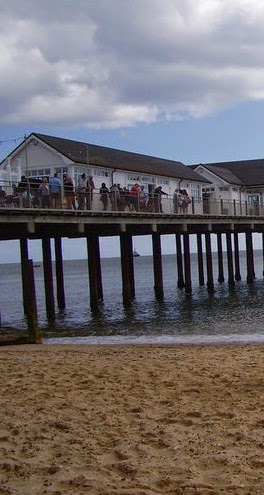‘Holiday Camp’ (1947) gave
us our first glance of the nation’s favourite post war family – The
Huggetts. They are just a few of the
camp residents whose week long stay is followed in the film. In the neighbouring chalets to Jack Warner
and Kathleen Harrison (Mr and Mrs Huggett) we see Dennis Price, Esma Cannon and
Flora Robson, all trying to make a fresh start for various reasons.
The film was made at a real
holiday camp in Filey, Yorkshire. Both in the film and in reality, the camp had
been commandeered for the army during World War Two. There are several pointers in this film which
show just how difficult this war was to shake off. I got a real feeling of
regimentation – in fact it has been suggested that the camp has a distinctly
Orwellian tone. There is certainly a
“You will enjoy yourselves or else” aura to the continual stream of tannoy
announcements. You had to eat when you
were told to; join in contests when you were told to; even bedtime was strongly
suggested. The chalets that you had to
return to at the end of the day were basic – two beds and a washstand – and you
may well find yourself sharing with a stranger. The film demonstrates that if
you were holidaying alone, or part of an oddly – numbered family, then you
ended up sleeping next to a hitherto unknown person (of the same sex,
naturally). Solitude was not allowed. This is quite unimaginable today – I’m sure
I’m not alone in being quite perturbed by the very idea. Yet they took it in
their stride, being veterans of a war where conscription shoved you into rooms
with strangers right, left and centre.
Today, we are a nation of determined
individuals. ‘Holiday Camp’ shows that
not so long ago we were happy to accept ourselves as a mass group of
people. Scenes of holidaymakers
disembarking from a train and taking part in a march re-inforce this. But we were just beginning to break out in
1947. The film’s vignettes deliberately
encourage the viewer to see the individual within the mass – and the tannoy
announcer (Esmond Knight) even refers to doing just this in his exchange with
Flora Robson. Meanwhile, Dennis Price
and Esma Cannon’s eventual outcome shows the dangers of strangers mixing too
closely. The British undoubtedly found the wartime way of life difficult to
shake off, but we were determined to make that break and move away from the
Orwellian threat. We managed it
well. A little too well, perhaps?
